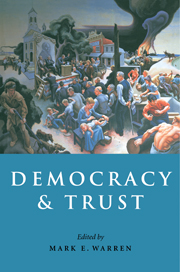Book contents
- Frontmatter
- Contents
- List of figures
- List of tables
- List of contributors
- Acknowledgments
- 1 Introduction
- 2 Do we want trust in government?
- 3 How can we trust our fellow citizens?
- 4 Trust, well-being and democracy
- 5 Democracy and social capital
- 6 Liberty against the democratic state: on the historical and contemporary sources of American distrust
- 7 Trust, voluntary association and workable democracy: the contemporary American discourse of civil society
- 8 Trust and its surrogates: psychological foundations of political process
- 9 Geographies of trust, geographies of hierarchy
- 10 Altruistic trust
- 11 Democratic theory and trust
- 12 Conclusion
- Index
11 - Democratic theory and trust
Published online by Cambridge University Press: 15 March 2010
- Frontmatter
- Contents
- List of figures
- List of tables
- List of contributors
- Acknowledgments
- 1 Introduction
- 2 Do we want trust in government?
- 3 How can we trust our fellow citizens?
- 4 Trust, well-being and democracy
- 5 Democracy and social capital
- 6 Liberty against the democratic state: on the historical and contemporary sources of American distrust
- 7 Trust, voluntary association and workable democracy: the contemporary American discourse of civil society
- 8 Trust and its surrogates: psychological foundations of political process
- 9 Geographies of trust, geographies of hierarchy
- 10 Altruistic trust
- 11 Democratic theory and trust
- 12 Conclusion
- Index
Summary
It is not obvious that trust should be of interest to theorists of democracy – except, perhaps, as an undesirable or unavoidable residue of undemocratic modes of governing and decision-making. After all, democratic progress is most often sparked by distrust of authorities. Innovations in democratic institutions usually involve new ways of monitoring and controlling those in power, on the assumption that, as a rule, those with power cannot or ought not to be trusted. In the first instance, democracy is about controlling, limiting, and distributing power. And democracy in this sense seems most necessary precisely when those who claim they are trustworthy are found to have abused their trust. Clearly, distrust is essential not only to democratic progress but also, we might think, to the healthy suspicion of power upon which the vitality of democracy depends.
As the essays in this volume suggest, although not all kinds of trust are good for democracy, it is increasingly clear that certain kinds are necessary to its stability, viability, and vitality. So the problem for democratic theory is to conceive of those kinds of trust that are good and necessary for democracy, as well as the ways that democratic institutions might protect, support, or generate those kinds of trust relations that are good in themselves. My aim in this chapter is to outline a democratic theory of trust. I shall proceed as follows. In the first section, I discuss generic reasons for the tense and often hostile relations between relations of trust and political relations.
- Type
- Chapter
- Information
- Democracy and Trust , pp. 310 - 345Publisher: Cambridge University PressPrint publication year: 1999
- 108
- Cited by



